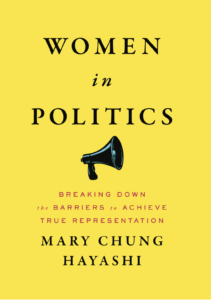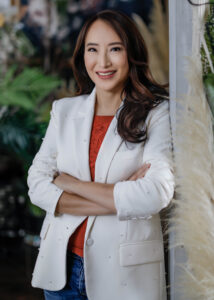
Guest Post by Lynette Nelson
Women in the U.S. face significant challenges when they decide to enter the political arena. Although women make up 51% of the population, they hold only 24 percent of gubernatorial seats, 28.7 percent of Congressional seats, and 32.7 percent of state legislative positions. True representative democracy thrives when all voices contribute to determining the important issues and societal regulations, and this (persistent) gap in representation leaves women out of the conversation for nearly all of the issues that govern their basic human rights. The reason for the shortfall starts at the beginning – mustering the courage to run and win a political race.
In her book Women in Politics, Mary Chung Hayashi provides readers a glimpse into her challenging political journey. As an Asian American woman, Mary was raised with the cultural instruction to be a “good girl” yet followed a path into the gritty world of politics. She knows all too well the difficult journey women must make to wield power and influence in government, but she also knows how important it is. Mary quotes Massachusetts Attorney General Maura Healey, who said, “I believe that representation matters.” She pointed out that we will have more effective laws, policies and government when those elected better reflect the diversity of our population.
In Part I of Women in Politics, Mary shares her journey and those of other prominent lawmakers such as Los Angeles Mayor Karen Bass, Florida state Senator Lauren Book, U.S. Senators Laphonza Butler, and Dianne Feinstein, California state Senator Jean Fuller, and more.
 She details the barriers women must overcome to join the political world in Part II. One being the imagination barrier. Noting that when those in leadership are men, it’s hard for young women to imagine themselves in those roles. Motherhood can be another serious barrier to overcome in politics. A female candidate without fail will face public scrutiny for spending time away from her children. Yet, if she does not have children, the standard criticism is that she lacks family values.
She details the barriers women must overcome to join the political world in Part II. One being the imagination barrier. Noting that when those in leadership are men, it’s hard for young women to imagine themselves in those roles. Motherhood can be another serious barrier to overcome in politics. A female candidate without fail will face public scrutiny for spending time away from her children. Yet, if she does not have children, the standard criticism is that she lacks family values.
In addition to seemingly endless lifestyle prejudices, the gender wealth gap is an added barrier that women must overcome in their pursuit of a political career. If a candidate is well funded early, other donors will have the confidence to invest in her campaign. Because women have only recently begun to acquire financial independence while contending with a gender pay gap, they lack the resources that men have entering the race.
These are all challenging barriers to overcome, but if you are a woman of color, you have one more hurdle to jump. Mary Hayashi found that because she was Asian, she was viewed as meek and subservient, which is obviously not ideal in political leadership. Yet when she spoke out about policy disagreements and shattered that stereotype, she was described as aggressive and competitive. Similar racial stereotypes haunt other women of color.
The media’s portrayal of women in politics is particularly insidious. Remember how the media portrayed Hillary Clinton and Sarah Palin in 2008? Journalist Amanda Fortini put it this way, they were “the hard-ass or the lightweight, the battle-ax or the bubblehead, the serious, pursed-lipped shrew or the silly, ineffectual girl.” The public can’t take women seriously when the media doesn’t take them seriously.
But thankfully, women can overcome those barriers. In Part III, Mary highlights the ways we can achieve gender parity, saying “The success of women candidates in our future elections will be achieved by concerted recruitment efforts, supporting women candidates with fundraising, and breaking down the cultural and racial barriers. Otherwise, we will not be able to sustain and ensure continued progress toward gender parity.”
If you are interested in politics, you will enjoy this book. Perhaps you have political aspirations but hit the imagination barrier or have channeled your desire to serve into the PTA or school board,. If you are still on the fence about making an impact, this book will encourage you to become more involved. The stories of those who have made a difference will inspire you and spark ideas about how to overcome the obstacles our society has created for women in politics. Getting past these barriers is crucial to eliminating prejudices about women’s leadership and creating more role models for girls who hope to become world tomorrow’s leaders and enabling them to make a difference in the world.
For more information about the book to go: https://www.maryhayashi.com/books/
